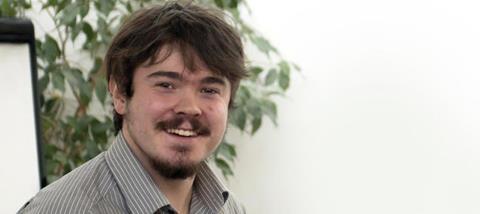
Sylvia Lowery remembers the moment she discovered that her four-year-old son had autism.
‘When Alex was diagnosed, all I could see was a black hole. I felt that God was far away from me and wasn’t hearing my prayers.’
As he grew up, Alex’s heightened senses meant that he found the world a ‘really terrifying place’.
‘A lot of things most people wouldn’t find loud, I found to be exceedingly loud,’ he says. ‘Even something as simple as going into a shop was a really scary experience for me because of the music played in the shops, all the people and how crowded it was. The dummies in the shops were scary. The lights were scary. The world was a really terrifying place.’
Now 21-years-old, Alex has made remarkable progress. He recently published his autobiography Thinking Club and regularly speaks to audiences across the UK about his battle with autism.
GROWING UP WITH AUTISM
Alex’s communications skills have not always been so good. He admits that he used to speak his ‘own language’ as a child. ‘I thought I was talking like everyone else, but no one seemed to properly understand me. This led to a lot of frustration and extreme behaviour,’ he recalls.
Between the ages of five and seven, Alex attended a special school for children with autism: ‘We were all children who had autism. Some of the children there didn’t have any language at all. Some would have a tendency to chase, scratch and bite. A lot of them couldn’t really help it, but I was scared of many of them.’
Having left the school, Alex received a variety of different therapies alongside his home-schooling. He credits this therapy and ‘a very supportive family’ with helping him make progress with spelling, reading, writing and concentration levels.
It wasn’t until Alex turned 11 that his parents told him that he had autism. It was a difficult moment for the whole family. Sylvia explains what happened: ‘Alex had to go to hospital in an ambulance with an asthma attack. I kept on spelling out autism to the medical staff. Alex asked me what this autism meant. I have always answered my children honestly when they ask a question, and so I told Alex he had a condition that made it harder for him to socialise and learn new things. Alex was very upset at first; he became very self-conscious.
‘Alex only began to accept and embrace his autism when I read him an article about Stephen Wiltshire, the artist who has autism and is able to draw complete landscapes after flying over it in a helicopter. This helped Alex to see the benefits of autism.’
UNDOING THE MISCONCEPTIONS
Hard though it is to define autism in a single sentence, Alex says that the disability means those affected ‘struggle to socialise, communicate and understand the world around them’. He says there are common misconceptions, such as thinking every autistic person has ‘a super genius ability with maths, or can tell you what day of the week you were born on in seconds’.
‘The majority of people with autism will have talents, but it’s unusual to have extraordinary talents,’ he says.
FINDING FAITH
Although Alex grew up in a Christian family, he didn’t find it easy to believe in God and ‘really struggled’ with the concept of a creator. ‘I used to have trouble believing in things I couldn’t see. For a while I couldn’t even believe there were other countries or the world was round because I hadn’t seen the world being round, so to me there wasn’t evidence of it. I could only believe in things I’d seen.
‘Before I became a Christian I used to hate going to church. I would have much rather stayed at home and watched The Muppets. I used to say in my head: “Shut up, pastor. Be quiet.” I really wanted it to end.’
The turning point came when Alex saw the BBC’s dramatic adaptation of CS Lewis’ The Lion, the Witch and the Wardrobe. He was nine years old. Alex was told that the story was an analogy for the good news: that Aslan represents Jesus and Edmund represents sinful humanity.
‘Because this was something visual that I had seen and understood, it opened my eyes to the gospel,’ he shares. ‘I don’t think I would be where I am without God’s help and support, which came from faith and all my prayers. Understanding the gospel opened my eyes to other things that I couldn’t see as well, like the world being round.’
I DON’T THINK I WOULD BE WHERE I AM WITHOUT GOD’S HELP
Alex is now able to go to church with a different attitude. He enjoys it, although he admits he can’t always concentrate for the whole service (a problem many non-autistic people can perhaps relate to!). Alex’s experience of church and faith as an autistic person has enabled him to speak up on church-related issues.
‘I think it’s important during sermons or Sunday school to explain the language in the gospel. It can be confusing and easy to take literally,’ he says. Alex used to find phrases such as ‘I am the door’ difficult to understand. ‘It’s important [for churches] to try and explain what the language is saying,’ he explains.
Another way in which his autism has impacted his faith is in his thinking about heaven. ‘When Christians have died I tend not to show quite as much sorrow as other people do,’ he says. ‘Often the way I feel is excitement that they’re now in heaven. It’s a different view to other people. The first time I heard about a person from the church who had died, I was quite excited about it!’
MOVING FORWARD
Sylvia says Alex is a ‘walking miracle’ compared with the way he was when he was younger. ‘However, autism still has a major effect on him,’ she explains. ‘He is unable to live independently at the moment and he needs support to manage his money, life and anxiety. I still find it hard to see Alex suffer. He has such an insight into his difficulties and is so able that the mismatch between his abilities and disabilities causes him a lot of frustration and anxiety. I admire Alex so much because he is so determined to keep on making progress.
‘One of the sad things that has become apparent as I have accompanied Alex to his speeches is that a lot of families who have children with autism or those who have autism themselves have not felt at home in the Church.
‘I feel that Alex has a very important message to give and that perhaps hearing what the world was like for Alex will bring about positive changes in people’s understanding.’
Alex’s book Thinking Club: A Filmstrip of My Life as a Person with Autism (Dolman Scott) is available now




























